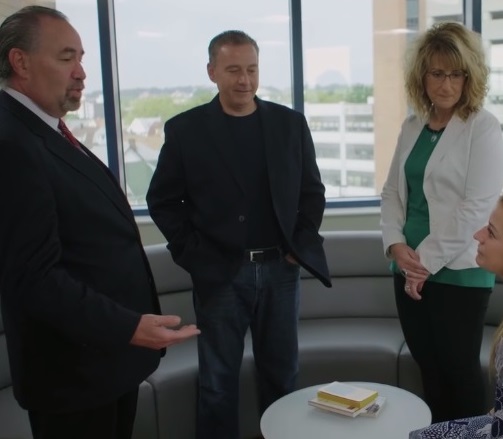 One day in 2016, Jacqueline Messina received a phone call no mother wants to receive. Her son Anthony was in the ICU and she needed to come to Jamaica Hospital.
One day in 2016, Jacqueline Messina received a phone call no mother wants to receive. Her son Anthony was in the ICU and she needed to come to Jamaica Hospital.
When she arrived she couldn’t believe her eyes. Anthony was sedated and on a ventilator. He was not the 24-year-old boisterous young man she knew; he was unresponsive. While they hoped and prayed daily with Father Andre that he would wake up and return to his family after rehabilitation, the prognosis grew worse as the days past. His brain injuries were escalating versus improving. The hospital’s Palliative Care team came to visit her in the ICU and she completely went silent. Jacqueline had no idea what the words “palliative care” even meant.
“It was an extremely difficult moment for our family. Who anticipates palliative and hospice care? We sat his brothers down and explained the next steps, but in our hearts, we were still confused about how his life was ending, a parent never imagines this.” One additional factor was Anthony’s grandmother. “They were so close and she was diagnosed with breast cancer the day of his accident,” shared Jacqueline. “I remember us trying to be strong for her despite my heart breaking because I was worried about how losing Anthony would affect her health and upcoming treatment.”
“I am not sure we could have endured this experience on our own. Thankfully we had the support of everyone on Jamaica Hospital’s hospice unit. They did so much to help my husband and boys as well as Anthony’s grandmother. They made sure the rest of our family and friends were well cared for,” she said.
Hours before his passing, Anthony was admitted to Jamaica Hospital’s Ferrara Family Center for Hospice Care after being transferred from the ICU. Jacqueline did not know what to expect, “I was anxious at first. I must have asked a million questions.”
Jacqueline’s anxieties subsided when she was greeted by a warm staff that addressed her concerns and treated her with compassion. They ensured her that Anthony was in good hands and they would do everything they could to make him comfortable. “The level of service we received was outstanding. The staff did more than what was needed during his time with us and after. They were amazing,” said Jacqueline.

Jacqueline Messina
The staff’s devotion to Anthony and his family inspired Jacqueline to give back. She donates to the hospice every year in honor of her son’s legacy. “When Anthony died, I wanted to make sure others had the same comfort that he did. This is why I work hard every year to accumulate volunteer hours of which my company Bloomberg L.P. converts into funds for charity. The program is called “Dollars for Your Hours” and I proudly support the Ferrara Family Center for Hospice Care with this gift,” shared Jacqueline.
The Ferrara Family for Hospice Care provides comfort care for those with life-limiting illnesses. Great pride is taken by their staff in providing patients and families with quality medical services as well as the emotional and spiritual support needed to help them through a challenging time.
To donate to the Ferrara Family Center for Hospice Care, please visit https://jamaicahospital.org/ways-to-give/
All content of this newsletter is intended for general information purposes only and is not intended or implied to be a substitute for professional medical advice, diagnosis or treatment. Please consult a medical professional before adopting any of the suggestions on this page. You must never disregard professional medical advice or delay seeking medical treatment based upon any content of this newsletter. PROMPTLY CONSULT YOUR PHYSICIAN OR CALL 911 IF YOU BELIEVE YOU HAVE A MEDICAL EMERGENCY.


